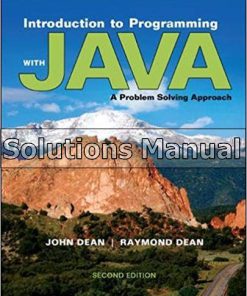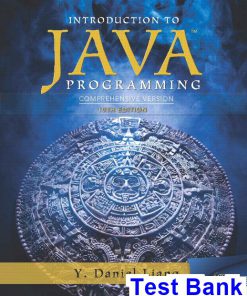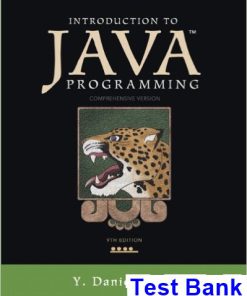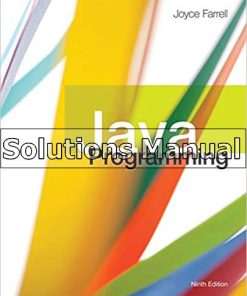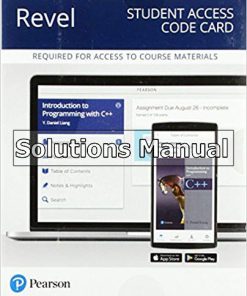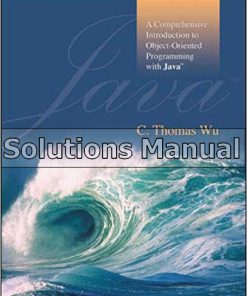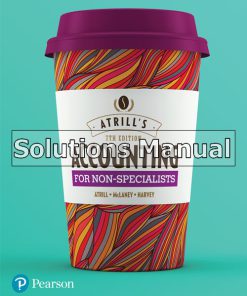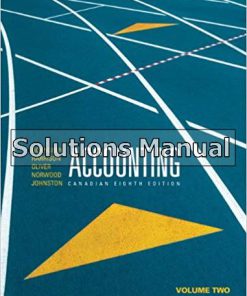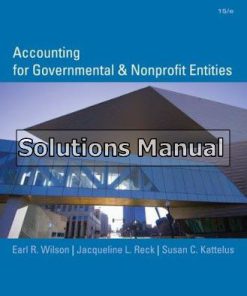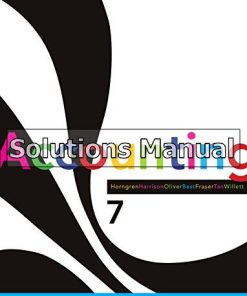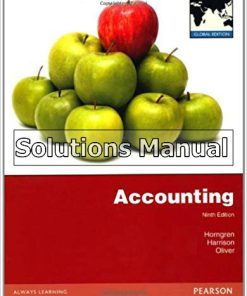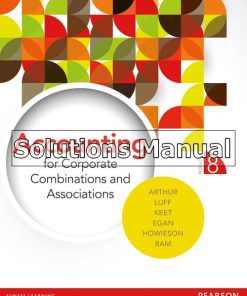Introduction to Java Programming Comprehensive Version 10th Edition Liang Solutions Manual
$26.50$50.00 (-47%)
Introduction to Java Programming Comprehensive Version 10th Edition Liang Solutions Manual.
You may also like
Introduction to Java Programming Comprehensive Version 10th Edition Liang Solutions Manual
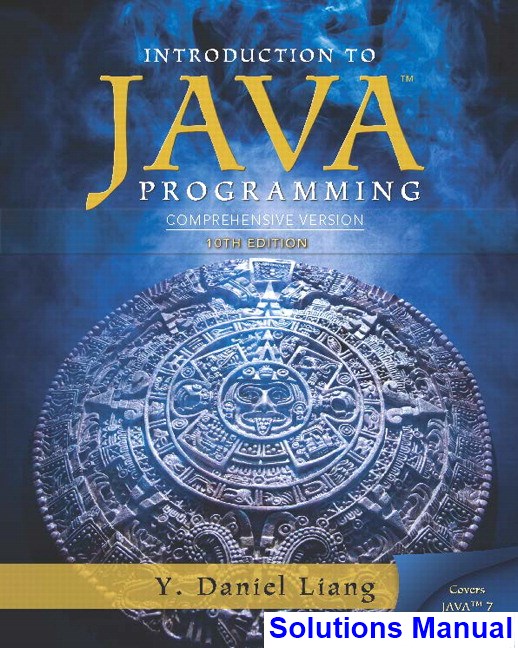
Product details:
- ISBN-10 : 0133761312
- ISBN-13 : 978-0133761313
- Author: Dr. Liang
Daniel Liang teaches concepts of problem-solving and object-oriented programming using a fundamentals-first approach. Beginning programmers learn critical problem-solving techniques then move on to grasp the key concepts of object-oriented, GUI programming, advanced GUI and Web programming using Java. Liang approaches Java GUI programming using JavaFX, not only because JavaFX is much simpler for new Java programmers to learn and use but because it has replaced Swing as the new GUI tool for developing cross-platform-rich Internet applications on desktop computers, on hand-held devices, and on the Web. Additionally, for instructors, JavaFXprovides a better teaching tool for demonstrating object-oriented programming.
Table contents:
- Chapter 1 Introduction to Computers, Programs, and Java
- Objectives
- 1.1 Introduction
- 1.2 What Is a Computer?
- 1.2.1 Central Processing Unit
- 1.2.2 Bits and Bytes
- 1.2.3 Memory
- 1.2.4 Storage Devices
- Disks
- CDs and DVDs
- USB Flash Drives
- 1.2.5 Input and Output Devices
- The Keyboard
- The Mouse
- The Monitor
- 1.2.6 Communication Devices
- 1.3 Programming Languages
- 1.3.1 Machine Language
- 1.3.2 Assembly Language
- 1.3.3 High-Level Language
- 1.4 Operating Systems
- 1.4.1 Controlling and Monitoring System Activities
- 1.4.2 Allocating and Assigning System Resources
- 1.4.3 Scheduling Operations
- 1.5 Java, the World Wide Web, and Beyond
- 1.6 The Java Language Specification, API, JDK, and IDE
- 1.7 A Simple Java Program
- Welcome to Java!
- 1.8 Creating, Compiling, and Executing a Java Program
- 1.9 Programming Style and Documentation
- 1.9.1 Appropriate Comments and Comment Styles
- 1.9.2 Proper Indentation and Spacing
- 1.9.3 Block Styles
- 1.10 Programming Errors
- 1.10.1 Syntax Errors
- 1.10.2 Runtime Errors
- 1.10.3 Logic Errors
- 1.10.4 Common Errors
- 1.11 Developing Java Programs Using NetBeans
- 1.11.1 Creating a Java Project
- 1.11.2 Creating a Java Class
- 1.11.3 Compiling and Running a Class
- 1.12 Developing Java Programs Using Eclipse
- 1.12.1 Creating a Java Project
- 1.12.2 Creating a Java Class
- 1.12.3 Compiling and Running a Class
- Key Terms
- Chapter Summary
- Quiz
- MyProgrammingLab™ Programming Exercises
- Chapter 2 Elementary Programming
- Objectives
- 2.1 Introduction
- 2.2 Writing a Simple Program
- 2.3 Reading Input from the Console
- 2.4 Identifiers
- 2.5 Variables
- 2.6 Assignment Statements and Assignment Expressions
- 2.7 Named Constants
- 2.8 Naming Conventions
- 2.9 Numeric Data Types and Operations
- 2.9.1 Numeric Types
- 2.9.2 Reading Numbers from the Keyboard
- 2.9.3 Numeric Operators
- 2.9.4 Exponent Operations
- 2.10 Numeric Literals
- 2.10.1 Integer Literals
- 2.10.2 Floating-Point Literals
- 2.10.3 Scientific Notation
- 2.11 Evaluating Expressions and Operator Precedence
- 2.12 Case Study: Displaying the Current Time
- 2.13 Augmented Assignment Operators
- 2.14 Increment and Decrement Operators
- 2.15 Numeric Type Conversions
- 2.16 Software Development Process
- 2.17 Case Study: Counting Monetary Units
- 2.18 Common Errors and Pitfalls
- Key Terms
- Chapter Summary
- Quiz
- MyProgrammingLab™ Programming Exercises
- Sections 2.13–2.17
- Chapter 3 Selections
- Objectives
- 3.1 Introduction
- 3.2 boolean Data Type
- 3.3 if Statements
- 3.4 Two-Way if-else Statements
- 3.5 Nested if and Multi-Way if-else Statements
- 3.6 Common Errors and Pitfalls
- 3.7 Generating Random Numbers
- 3.8 Case Study: Computing Body Mass Index
- 3.9 Case Study: Computing Taxes
- 3.10 Logical Operators
- 3.11 Case Study: Determining Leap Year
- 3.12 Case Study: Lottery
- 3.13 switch Statements
- 3.14 Conditional Expressions
- 3.15 Operator Precedence and Associativity
- 3.16 Debugging
- Key Terms
- Chapter Summary
- Test Questions
- MyProgrammingLab™ Programming Exercises
- Section 3.2
- Sections 3.3–3.7
- Sections 3.8–3.16
- Comprehensive
- Chapter 4 Mathematical Functions, Characters, and Strings
- Objectives
- 4.1 Introduction
- 4.2 Common Mathematical Functions
- 4.2.1 Trigonometric Methods
- 4.2.2 Exponent Methods
- 4.2.3 The Rounding Methods
- 4.2.4 The min , max , and abs Methods
- 4.2.5 The random Method
- 4.2.6 Case Study: Computing Angles of a Triangle
- 4.3 Character Data Type and Operations
- 4.3.1 Unicode and ASCII code
- 4.3.2 Escape Sequences for Special Characters
- 4.3.3 Casting between char and Numeric Types
- 4.3.4 Comparing and Testing Characters
- 4.4 The String Type
- 4.4.1 Getting String Length
- 4.4.2 Getting Characters from a String
- 4.4.3 Concatenating Strings
- 4.4.4 Converting Strings
- 4.4.5 Reading a String from the Console
- 4.4.6 Reading a Character from the Console
- 4.4.7 Comparing Strings
- 4.4.8 Obtaining Substrings
- 4.4.9 Finding a Character or a Substring in a String
- 4.4.10 Conversion between Strings and Numbers
- 4.5 Case Studies
- 4.5.1 Case Study: Guessing Birthdays
- 4.5.2 Case Study: Converting a Hexadecimal Digit to a Decimal Value
- 4.5.3 Case Study: Revising the Lottery Program Using Strings
- 4.6 Formatting Console Output
- Key Terms
- Chapter Summary
People also search:
intro to java programming comprehensive version (10th edition) solutions
intro to java programming comprehensive version (10th edition) solutions pdf
intro to java programming comprehensive version (10th edition) solutions pdf free
intro to java programming comprehensive version (10th edition) solutions download scribd
intro to java programming comprehensive version (10th edition) solutions manual

